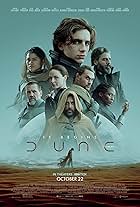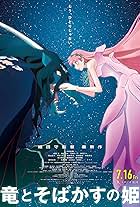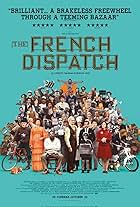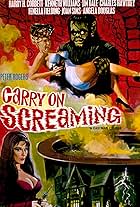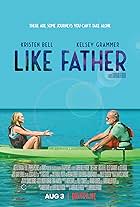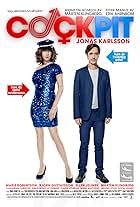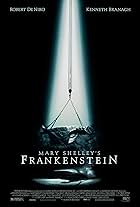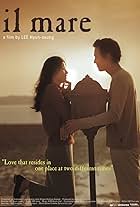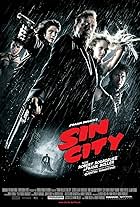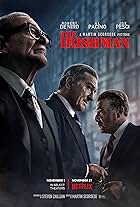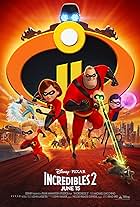
themadmovieman
Joined Jan 2013
Welcome to the new profile
We're still working on updating some profile features. To see the badges, ratings breakdowns, and polls for this profile, please go to the previous version.
Ratings3.3K
themadmovieman's rating
Reviews224
themadmovieman's rating
One of the most mesmerising films you'll ever see, Spencer is an intoxicating psychodrama from start to finish, combining a brilliant lead performance from Kristen Stewart with spellbinding direction from Pablo Larraín, an exhilarating musical score, powerfully claustrophobic cinematography and an enthralling, thematically rich adaptation of the famous life of Diana, Princess of Wales.
I was absolutely floored by Spencer, which is on the same level as Larraín's masterful Jackie in terms of its dramatic intensity and power. However, it's important to know going in that Spencer isn't a film there to give you a historical account of one Christmas that Diana spent with the in-laws.
This isn't a factual biopic, but rather a 'fable from a true tragedy' as the film calls it at the beginning. The setting at Christmas at Sandringham simply serves as a canvas onto which we see the main themes of Diana's life in the Royal Family painted out in abstract, imaginative and powerfully enthralling fashion.
So, don't go in expecting pure historical fact, but do go in expecting one of the most uncomfortable, intense dramatic experiences you're ever likely to have. Spencer almost takes things up a level from Jackie, going beyond overwhelming grief into a realm of near-madness, as we witness Diana driven to the verge of breaking down by the obtuse world in which she finds herself.
Throughout, the Sandringham Estate is painted as a kind of haunted house, shrouded in mist and full of eerie corridors where you almost never encounter the hosts of an infuriating Christmas. Coupled with the film's intoxicating, claustrophobic cinematography and one of the most unsettling musical scores I have ever heard, it's remarkable just how much Spencer feels like a true nightmare, like The Shining come to life.
And I'll say it again - this is why you can't watch this film as a typical biopic. Its overarching themes are certainly based in historical truth, but are moulded and adapted to fit into a brilliantly concise portrayal of some of the main anxieties that surrounded Diana at the height of her Royal fame.
The screenplay here is particularly sparing with dialogue, almost all of which uttered in breathy, timid whispers, as director Pablo Larraín leaves much of the film's drama to be inferred from the exhilarating, ominous haunted house atmosphere, and the hypnotic lead performance from Kristen Stewart.
While there are moments where Stewart's performance borders on showy, this is actually a very measured and very powerful performance that demands immense physicality from the actress, as she portrays Diana descending into a kind of madness, surrounded by repetitive, frustrating events that feel like a nightmare.
Much like Natalie Portman's performance as Jackie Kennedy, Stewart is full of intense emotion at every minute here, with facial expressions and a demeanour that resonate far more powerfully than any single line of dialogue. It's not exactly what you would call the most historically accurate portrayal of Diana, but it's a gripping, imaginative and bold amalgamation of many of her defining traits.
And with that, Spencer delivers exhilarating, intoxicating psychodrama of the highest order from start to finish. There may be a few moments in which the film's allusions to the length and breadth of British royal history are a little on the nose, but this is an expertly-crafted film that certainly doesn't hold back at any moment.
Intense, uncomfortable, and downright maddening at times, Spencer is a uniquely mesmerising vision of a troubled part of British royal history, featuring a staggering lead performance, ingenious direction, incredible music, spellbinding visuals and a masterful screenplay from start to finish.
I was absolutely floored by Spencer, which is on the same level as Larraín's masterful Jackie in terms of its dramatic intensity and power. However, it's important to know going in that Spencer isn't a film there to give you a historical account of one Christmas that Diana spent with the in-laws.
This isn't a factual biopic, but rather a 'fable from a true tragedy' as the film calls it at the beginning. The setting at Christmas at Sandringham simply serves as a canvas onto which we see the main themes of Diana's life in the Royal Family painted out in abstract, imaginative and powerfully enthralling fashion.
So, don't go in expecting pure historical fact, but do go in expecting one of the most uncomfortable, intense dramatic experiences you're ever likely to have. Spencer almost takes things up a level from Jackie, going beyond overwhelming grief into a realm of near-madness, as we witness Diana driven to the verge of breaking down by the obtuse world in which she finds herself.
Throughout, the Sandringham Estate is painted as a kind of haunted house, shrouded in mist and full of eerie corridors where you almost never encounter the hosts of an infuriating Christmas. Coupled with the film's intoxicating, claustrophobic cinematography and one of the most unsettling musical scores I have ever heard, it's remarkable just how much Spencer feels like a true nightmare, like The Shining come to life.
And I'll say it again - this is why you can't watch this film as a typical biopic. Its overarching themes are certainly based in historical truth, but are moulded and adapted to fit into a brilliantly concise portrayal of some of the main anxieties that surrounded Diana at the height of her Royal fame.
The screenplay here is particularly sparing with dialogue, almost all of which uttered in breathy, timid whispers, as director Pablo Larraín leaves much of the film's drama to be inferred from the exhilarating, ominous haunted house atmosphere, and the hypnotic lead performance from Kristen Stewart.
While there are moments where Stewart's performance borders on showy, this is actually a very measured and very powerful performance that demands immense physicality from the actress, as she portrays Diana descending into a kind of madness, surrounded by repetitive, frustrating events that feel like a nightmare.
Much like Natalie Portman's performance as Jackie Kennedy, Stewart is full of intense emotion at every minute here, with facial expressions and a demeanour that resonate far more powerfully than any single line of dialogue. It's not exactly what you would call the most historically accurate portrayal of Diana, but it's a gripping, imaginative and bold amalgamation of many of her defining traits.
And with that, Spencer delivers exhilarating, intoxicating psychodrama of the highest order from start to finish. There may be a few moments in which the film's allusions to the length and breadth of British royal history are a little on the nose, but this is an expertly-crafted film that certainly doesn't hold back at any moment.
Intense, uncomfortable, and downright maddening at times, Spencer is a uniquely mesmerising vision of a troubled part of British royal history, featuring a staggering lead performance, ingenious direction, incredible music, spellbinding visuals and a masterful screenplay from start to finish.
A dazzlingly vivid portrayal of London, an emotionally captivating and thought-provoking pscyhodrama, a visually magnificent production and yet another home run for director Edgar Wright, Last Night In Soho is an absolutely mesmerising watch, and easily one of the best films of 2021.
I loved every minute of Last Night In Soho, a film that evolves and changes a lot over its 116-minute runtime, but always has a trick up its sleeve as it takes bold and thrilling turns at every step.
There's so much that makes this film such a dazzling watch, but we'll start with the brilliant lead performances from Thomasin McKenzie and Anya Taylor-Joy, whose fantastic energy makes this movie an enthralling watch from the first minute they arrive on screen.
While Edgar Wright impressively directs a whole ensemble cast here, McKenzie and Taylor-Joy are the real standouts, each delivering genuine yet exciting and mysterious performances that bounce off and parallel one another brilliantly throughout.
That plays into the film's captivating psychological element, as we see young Thomasin McKenzie in modern-day London become obsessed with Taylor-Joy, an aspiring singer whose dreams take a dark turn when she finds herself caught up in the underbelly of Soho in the swingin' sixties.
Not only does Last Night In Soho brilliantly balance its focus on modern-day London and that of yesteryear, but it uses parallels in geography, style and essence to great effect, bringing that into the central character story at hand and pulling you ever deeper into what starts out as a dazzling whirlwind, but becomes something rather a lot more challenging.
The first act of this film is exciting, vibrant and wonderfully imaginative, capturing the wide-eyed innocence of a country girl arriving in the big city for the first time. But beneath the superficial thrill of a lively London lies a dark reality, which Last Night In Soho handles in a uniquely lively way, but also with riveting, thought-provoking dramatic depth.
While never ignoring the gritty, sobering and desperately depressing reality of the industry that underpinned Soho in the '60s, director Edgar Wright brilliantly keeps the energy and pizzazz that makes this movie so electrifying even through its darkest moments.
That makes for an exhilarating blend of disturbing drama, eye-catching style and even some darkly funny moments that build and build and build as we see the psychological state of our main characters deteriorate.
While Last Night In Soho may be all The Look Of Love on the surface, it's rather more similar to Roman Polanski's Repulsion, using its setting to brilliant effect as it turns from a dark love letter to London into a maddening psychological thriller that never lets up until the last minute.
Bathed in spectacular colours, featuring gorgeous cinematography and a memorable soundtrack, Edgar Wright leaves no stone unturned when delivering yet another feast for the senses after the rocking rollercoaster that was Baby Driver.
But with a bold combination of dark, sobering drama and high-octane, lively and dazzling thrills, Last Night In Soho offers up an entirely unique viewing experience, that's simultaneously huge fun to watch while being immensely insightful and thought-provoking in its subject matter.
I loved every minute of Last Night In Soho, a film that evolves and changes a lot over its 116-minute runtime, but always has a trick up its sleeve as it takes bold and thrilling turns at every step.
There's so much that makes this film such a dazzling watch, but we'll start with the brilliant lead performances from Thomasin McKenzie and Anya Taylor-Joy, whose fantastic energy makes this movie an enthralling watch from the first minute they arrive on screen.
While Edgar Wright impressively directs a whole ensemble cast here, McKenzie and Taylor-Joy are the real standouts, each delivering genuine yet exciting and mysterious performances that bounce off and parallel one another brilliantly throughout.
That plays into the film's captivating psychological element, as we see young Thomasin McKenzie in modern-day London become obsessed with Taylor-Joy, an aspiring singer whose dreams take a dark turn when she finds herself caught up in the underbelly of Soho in the swingin' sixties.
Not only does Last Night In Soho brilliantly balance its focus on modern-day London and that of yesteryear, but it uses parallels in geography, style and essence to great effect, bringing that into the central character story at hand and pulling you ever deeper into what starts out as a dazzling whirlwind, but becomes something rather a lot more challenging.
The first act of this film is exciting, vibrant and wonderfully imaginative, capturing the wide-eyed innocence of a country girl arriving in the big city for the first time. But beneath the superficial thrill of a lively London lies a dark reality, which Last Night In Soho handles in a uniquely lively way, but also with riveting, thought-provoking dramatic depth.
While never ignoring the gritty, sobering and desperately depressing reality of the industry that underpinned Soho in the '60s, director Edgar Wright brilliantly keeps the energy and pizzazz that makes this movie so electrifying even through its darkest moments.
That makes for an exhilarating blend of disturbing drama, eye-catching style and even some darkly funny moments that build and build and build as we see the psychological state of our main characters deteriorate.
While Last Night In Soho may be all The Look Of Love on the surface, it's rather more similar to Roman Polanski's Repulsion, using its setting to brilliant effect as it turns from a dark love letter to London into a maddening psychological thriller that never lets up until the last minute.
Bathed in spectacular colours, featuring gorgeous cinematography and a memorable soundtrack, Edgar Wright leaves no stone unturned when delivering yet another feast for the senses after the rocking rollercoaster that was Baby Driver.
But with a bold combination of dark, sobering drama and high-octane, lively and dazzling thrills, Last Night In Soho offers up an entirely unique viewing experience, that's simultaneously huge fun to watch while being immensely insightful and thought-provoking in its subject matter.
From one of the best directors in modern anime, Belle is one of the most spectacular movies in the genre for a long time. Complete with typically gorgeous animation, an electrifying pace, riveting character depth, sweet humour and a handful of wonderful songs, this is a film that you won't be able to take your eyes off from start to finish.
But why exactly does Belle have this spectacular star quality? After all director Mamoru Hosoda has managed time and again to tell incredible stories, from The Girl Who Leapt Through Time to Summer Wars, Wolf Children, The Boy And The Beast and Mirai.
Not only is Belle the latest addition to Hosoda's incredible repertoire, but it's also one of the most dynamic anime films of recent years, blending the classic animation style with timeless storytelling and blockbuster-level action and thrills.
It's a film that really transports you to another world, with the as-ever spellbinding visuals delivering some of the most immersive fantasy you'll have seen in a long time, bolstering the film's originality from what at first feels like a mish-mash of different stories.
In the early stages, it's easy to see Belle as a bit of an update of Hosoda's own Summer Wars, along with influence from Hollywood's Ready Player One. What's more, the film also borrows heavily at moments from Disney's Beauty And The Beast, although that's more as a clever homage than a simple reinvention.
However, because there's so much going on, Belle proves itself to be a lot more than a remake or update of those films mentioned above. In fact, what's most impressive is the way in which it so effectively balances its focus between life inside the virtual world of U, and the characters who live in the real world.
Much like Summer Wars, the action in the virtual world is brilliantly complemented by the emotional stories of the characters in the real world, in this case a group of high schoolers who are living through all the typical trappings of a coming-of-age story.
This is where much of Belle's emotional heart comes in, and while the action in the virtual world is absolutely spectacular, you care for the characters because of how they're developed in the real world, with a wonderful group of friends whose own back stories play in wonderfully to the central action story.
Playing out at an electrifying pace for the vast majority of its runtime, Belle nears edge-of-your-seat levels of excitement, although its finale admittedly isn't as exhilarating as the thrilling conclusion to Summer Wars.
That said, Hosoda directs Belle with such confidence that it's a mesmerising watch at every moment, boosted further by a couple of spectacular and memorable songs that are both fun to listen to, and play nicely into the film's narrative arc.
All in all, I had a whale of a time with Belle. A genuinely thrilling watch from start to finish, the film is a spectacular combination of many of director Mamoru Hosoda's best films, along with homages to a number of others. However, with fresh storytelling, fast pacing, gorgeous visuals, riveting emotional depth and thrilling action throughout, this film certainly stands on its own as one of the most entertaining anime you'll have seen in a long time.
But why exactly does Belle have this spectacular star quality? After all director Mamoru Hosoda has managed time and again to tell incredible stories, from The Girl Who Leapt Through Time to Summer Wars, Wolf Children, The Boy And The Beast and Mirai.
Not only is Belle the latest addition to Hosoda's incredible repertoire, but it's also one of the most dynamic anime films of recent years, blending the classic animation style with timeless storytelling and blockbuster-level action and thrills.
It's a film that really transports you to another world, with the as-ever spellbinding visuals delivering some of the most immersive fantasy you'll have seen in a long time, bolstering the film's originality from what at first feels like a mish-mash of different stories.
In the early stages, it's easy to see Belle as a bit of an update of Hosoda's own Summer Wars, along with influence from Hollywood's Ready Player One. What's more, the film also borrows heavily at moments from Disney's Beauty And The Beast, although that's more as a clever homage than a simple reinvention.
However, because there's so much going on, Belle proves itself to be a lot more than a remake or update of those films mentioned above. In fact, what's most impressive is the way in which it so effectively balances its focus between life inside the virtual world of U, and the characters who live in the real world.
Much like Summer Wars, the action in the virtual world is brilliantly complemented by the emotional stories of the characters in the real world, in this case a group of high schoolers who are living through all the typical trappings of a coming-of-age story.
This is where much of Belle's emotional heart comes in, and while the action in the virtual world is absolutely spectacular, you care for the characters because of how they're developed in the real world, with a wonderful group of friends whose own back stories play in wonderfully to the central action story.
Playing out at an electrifying pace for the vast majority of its runtime, Belle nears edge-of-your-seat levels of excitement, although its finale admittedly isn't as exhilarating as the thrilling conclusion to Summer Wars.
That said, Hosoda directs Belle with such confidence that it's a mesmerising watch at every moment, boosted further by a couple of spectacular and memorable songs that are both fun to listen to, and play nicely into the film's narrative arc.
All in all, I had a whale of a time with Belle. A genuinely thrilling watch from start to finish, the film is a spectacular combination of many of director Mamoru Hosoda's best films, along with homages to a number of others. However, with fresh storytelling, fast pacing, gorgeous visuals, riveting emotional depth and thrilling action throughout, this film certainly stands on its own as one of the most entertaining anime you'll have seen in a long time.




